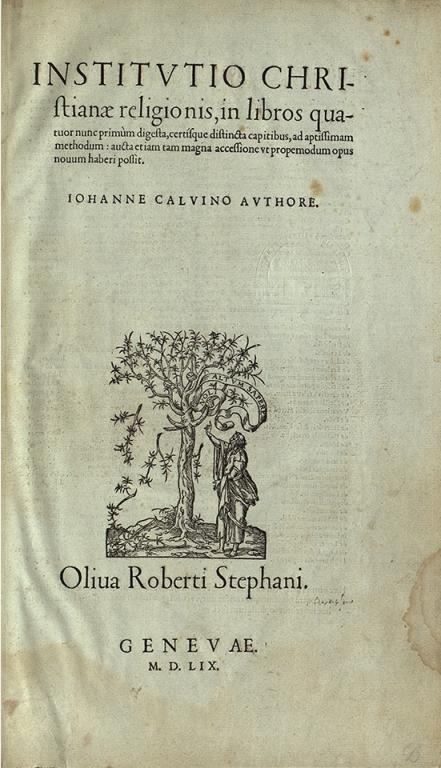John Calvin’s Institutes of Christian Religion: manuscript from Geneva: Robert Estienne, definitive fourth edition 1559. [public domain / Wikimedia Commons]
* * * * *
John 12:32 (RSV) and I, when I am lifted up from the earth, will draw all men to myself.
If Jesus died only for the elect (those who are saved in the end), — as the Calvinist / Reformed tradition holds — what does it mean here that all men are drawn to Him? It makes no sense. Those who are “totally depraved” in Reformed / Calvinist thought (the “T” in “TULIP”) would not be drawn at all. There’s no reason to be “drawn” to Christ at all in this thinking, since there is no hope whatsoever of being saved, if Christ died only for the elect (limited atonement, or the “L” in “TULIP”) and not all men.
Moreover, according to Calvinist notion of irresistible grace (contra the free will of man): the “I” in “TULIP” — if a man were “drawn” to Christ, that would already necessarily be grace moving him in that direction (as all Christians agree: God always starts the process), and he wouldn’t be able to resist it. Yet we know people do resist this grace (even accept it and later fall away from or reject it) and are damned.
The passage makes perfect sense, on the other hand, and is coherent within the paradigms of Catholic, Orthodox, and Protestant Arminian / Wesleyan free will soteriology, but not in Calvinist soteriology. Jesus died for all, and offers sufficient grace for anyone to be saved, if they would (by the power of God’s grace) only accept this free gift of grace. But many reject it.
How does John Calvin exegete the passage (let’s do a little bit of the analysis that I used in my book, The Catholic Verses)? Here’s what he wrote, from his Commentaries:
“The word ‘all,’ which he employs, must be understood to refer to the children of God, who belong to his flock. Yet I agree with Chrysostom, who says that Christ used the universal term, ‘all,’ because the Church was to be gathered equally from among Gentiles and Jews.”
As usual with Calvin, however (and habitually with anti-Catholics today), he selectively cites the fathers, according to his ends. St. John Chrysostom, of course, believed in universal atonement:
Now if all have sinned, how come some to be saved, and some to perish? It is because all were not minded to come to Him, since for His part all were saved, for all were called. (Homily XVI on Romans 9:1: v. 9:10; NPNF1-11)
God, however, being very good, shows the same kindness to both. For it was not those in a state of salvation only to whom He showed mercy, but also Pharaoh, as far as His part went. For of the same long-suffering, both they and he had the advantage. And if he was not saved, it was quite owing to his own will: since, as for what concerneth God, he had as much done for him as they who were saved. (Homily XVI on Romans 9:1: v. 9:22-24; NPNF1-11)
So he says here also, “For the same Lord over all is rich unto all (and upon all).” (Rom. iii. 22.) You see how he sets Him forth as exceedingly desiring our salvation, since He even reckons this to be riches to Himself; so that they are not even now to despair, or fancy that, provided they would repent, they were unpardonable. For He who considereth it as riches to Himself to save us, will not cease to be rich. Since even this is riches, the fact of the gift being shed forth unto all. . . . “For whosoever,” he says, “believeth on Him shall not be ashamed” (Is. xxviii. 16); and, “Whosoever shall call upon the Name of the Lord shall be saved.” (Joel ii. 32.) (Homily XVII on Romans 10:1: v. 10:11-13; NPNF1-11)
Ver. 6. “Who gave Himself a ransom for all to be testified in due time.” Was Christ then a ransom for the Heathen? Undoubtedly Christ died even for Heathen; . . . (Homily VII on 1 Timothy, v. 2:6; NPNF1-13)
. . . He came for the salvation of all. (Homily LVII on John, v. 9:8-9; NPNF1-14)
There are many passages in the Bible, too, that teach universal atonement.














